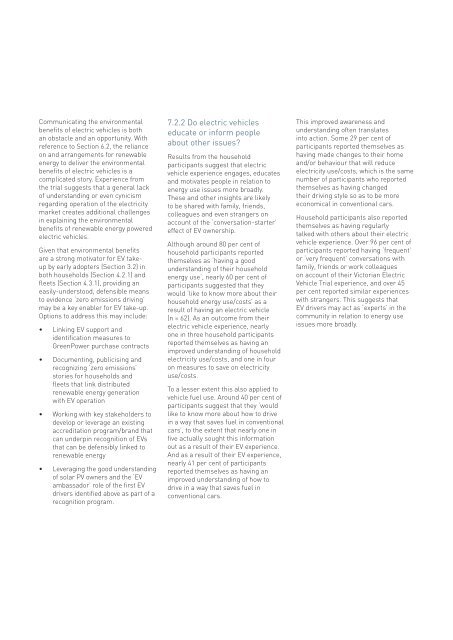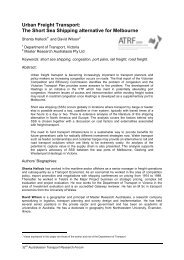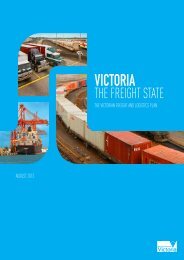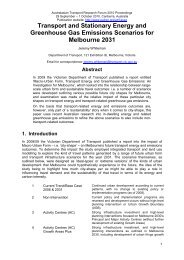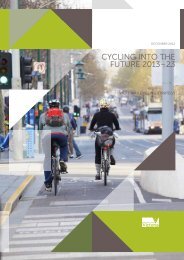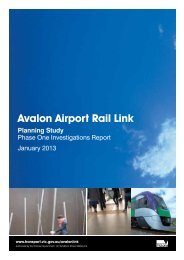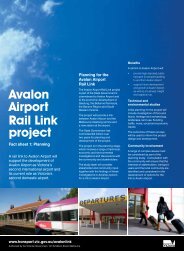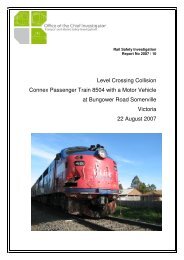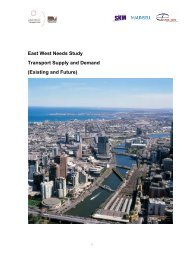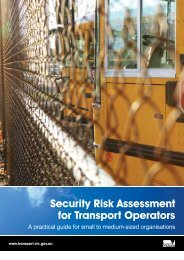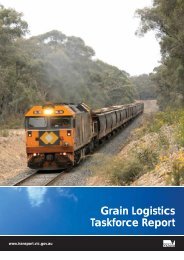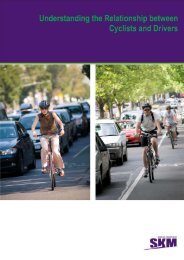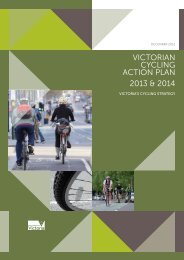victorian electric vehicle trial mid-term report - Department of Transport
victorian electric vehicle trial mid-term report - Department of Transport
victorian electric vehicle trial mid-term report - Department of Transport
- No tags were found...
You also want an ePaper? Increase the reach of your titles
YUMPU automatically turns print PDFs into web optimized ePapers that Google loves.
Communicating the environmentalbenefits <strong>of</strong> <strong>electric</strong> <strong>vehicle</strong>s is bothan obstacle and an opportunity. Withreference to Section 6.2, the relianceon and arrangements for renewableenergy to deliver the environmentalbenefits <strong>of</strong> <strong>electric</strong> <strong>vehicle</strong>s is acomplicated story. Experience fromthe <strong>trial</strong> suggests that a general lack<strong>of</strong> understanding or even cynicismregarding operation <strong>of</strong> the <strong>electric</strong>itymarket creates additional challengesin explaining the environmentalbenefits <strong>of</strong> renewable energy powered<strong>electric</strong> <strong>vehicle</strong>s.Given that environmental benefitsare a strong motivator for EV takeupby early adopters (Section 3.2) inboth households (Section 4.2.1) andfleets (Section 4.3.1), providing aneasily-understood, defensible meansto evidence ‘zero emissions driving’may be a key enabler for EV take-up.Options to address this may include:• Linking EV support andidentification measures toGreenPower purchase contracts• Documenting, publicising andrecognizing ‘zero emissions’stories for households andfleets that link distributedrenewable energy generationwith EV operation• Working with key stakeholders todevelop or leverage an existingaccreditation program/brand thatcan underpin recognition <strong>of</strong> EVsthat can be defensibly linked torenewable energy• Leveraging the good understanding<strong>of</strong> solar PV owners and the ‘EVambassador’ role <strong>of</strong> the first EVdrivers identified above as part <strong>of</strong> arecognition program.7.2.2 Do <strong>electric</strong> <strong>vehicle</strong>seducate or inform peopleabout other issues?Results from the householdparticipants suggest that <strong>electric</strong><strong>vehicle</strong> experience engages, educatesand motivates people in relation toenergy use issues more broadly.These and other insights are likelyto be shared with family, friends,colleagues and even strangers onaccount <strong>of</strong> the ‘conversation-starter’effect <strong>of</strong> EV ownership.Although around 80 per cent <strong>of</strong>household participants <strong>report</strong>edthemselves as ‘having a goodunderstanding <strong>of</strong> their householdenergy use’, nearly 60 per cent <strong>of</strong>participants suggested that theywould ‘like to know more about theirhousehold energy use/costs’ as aresult <strong>of</strong> having an <strong>electric</strong> <strong>vehicle</strong>(n = 62). As an outcome from their<strong>electric</strong> <strong>vehicle</strong> experience, nearlyone in three household participants<strong>report</strong>ed themselves as having animproved understanding <strong>of</strong> household<strong>electric</strong>ity use/costs, and one in fouron measures to save on <strong>electric</strong>ityuse/costs.To a lesser extent this also applied to<strong>vehicle</strong> fuel use. Around 40 per cent <strong>of</strong>participants suggest that they ‘wouldlike to know more about how to drivein a way that saves fuel in conventionalcars’, to the extent that nearly one infive actually sought this informationout as a result <strong>of</strong> their EV experience.And as a result <strong>of</strong> their EV experience,nearly 41 per cent <strong>of</strong> participants<strong>report</strong>ed themselves as having animproved understanding <strong>of</strong> how todrive in a way that saves fuel inconventional cars.This improved awareness andunderstanding <strong>of</strong>ten translatesinto action. Some 29 per cent <strong>of</strong>participants <strong>report</strong>ed themselves ashaving made changes to their homeand/or behaviour that will reduce<strong>electric</strong>ity use/costs, which is the samenumber <strong>of</strong> participants who <strong>report</strong>edthemselves as having changedtheir driving style so as to be moreeconomical in conventional cars.Household participants also <strong>report</strong>edthemselves as having regularlytalked with others about their <strong>electric</strong><strong>vehicle</strong> experience. Over 96 per cent <strong>of</strong>participants <strong>report</strong>ed having ‘frequent’or ‘very frequent’ conversations withfamily, friends or work colleagueson account <strong>of</strong> their Victorian ElectricVehicle Trial experience, and over 45per cent <strong>report</strong>ed similar experienceswith strangers. This suggests thatEV drivers may act as ‘experts’ in thecommunity in relation to energy useissues more broadly.


